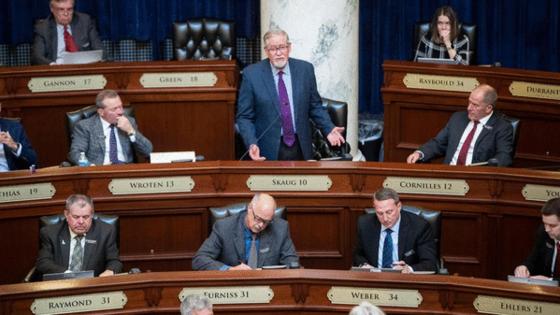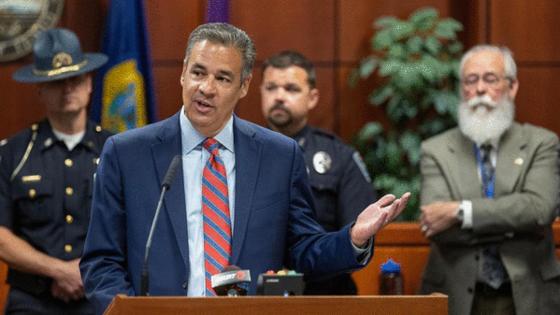Lawmaker behind Idaho's firing squad questions Kohberger dodging death penalty
Published in News & Features
BOISE, Idaho — The Idaho lawmaker who spearheaded the state’s shift to firing squad executions said he was frustrated with the outcome of the University of Idaho student murder case that allowed Bryan Kohberger to escape the death penalty.
The four victims’ families — and the public — deserved a trial in the high-profile case, and a jury should have had the right to determine the proper punishment for Kohberger, Rep. Bruce Skaug, R-Nampa told the Idaho Statesman. Instead, Kohberger sought a plea offer from prosecutors just weeks before jury selection was to begin and agreed to plead guilty to fatally stabbing four U of I undergraduates.
“I’m not blaming or arguing with the decision of the prosecuting attorney’s office, but I’m disappointed, personally, there was not a trial and a death penalty phase of that trial,” Skaug said in a phone interview. “If the murders in Moscow are not a case for the death penalty, then what is?”
Kohberger, 30, was sentenced last month to four consecutive life terms in prison for four counts of first-degree murder and to another decade for a count of felony burglary, without the possibility of parole, as well as ordered to pay more than $250,000 in fines. Kohberger in the plea deal also agreed to waive his right to all appeals.
The victims were childhood best friends Madison Mogen and Kaylee Goncalves, both 21, and couple Xana Kernodle and Ethan Chapin, both 20. They were found dead with several stab wounds at an off-campus home in Moscow in November 2022.
The plea agreement obtained by Latah County Prosecutor Bill Thompson came with public scrutiny. The longtime Moscow resident defended it as in the best interest of justice, and to ensure certainty and finality in the nearly three-year-old case.
Attorney Ingrid Batey was a member of the Kohberger prosecution team for the majority of the case as an Idaho deputy attorney general at the time, and told the Statesman she supports the end result. Criticism of Thompson have been difficult to hear, she said. Detractors have at times claimed Thompson’s decision stemmed from his opposition to the death penalty.
“I know how he treated this case when I worked on it with him, and he was thinking about what was in everybody’s best interest,” Batey said in an interview. “I 100% believe that Bill was trying to do right by the greatest number of people.”
The four victims’ families were split on the outcome of the case. Most vocal against the plea deal was the Goncalves family, several of whom said they were let down and even felt betrayed by prosecutors for removing the possibility of the death penalty for Kohberger without a trial.
“My feelings are with all the victims,” Skaug said. “The Goncalves family, though, probably expresses a lot of my personal views as a citizen of Idaho.”
Deputy Attorney General Jeff Nye, who heads the agency’s criminal law division, was also a member of the prosecution in the Kohberger case. Thompson’s team had to weigh a number of factors over whether to accept Kohberger’s guilty pleas in exchange for dropping its pursuit of capital punishment, Nye told the Statesman.
“I think there were very good reasons to not do it that don’t have anything to do with his culpability,” he said in a phone interview. “We talked about it, and we talked about what a conclusion looks like here and what’s right or not. … At the end of the day, I support the decision that Bill made.”
Lawmaker says firing squad is ‘more humane’ than other methods
Skaug is a retired attorney who worked as a deputy prosecutor in Ada County in the early 1990s. He is serving in his third term as a state representative after six years on the Nampa City Council, and also has ties to Moscow.
Skaug earned his bachelor’s and law degrees at the U of I. His son and daughter-in-law and their four kids live there, and he visits them often. In the days and weeks after the students’ stabbing deaths, Skaug recalled, he was on text threads with family and friends who shared concerns over the community tragedy.
“We felt that personally, the fear that ran through the city with what happened,” he said. “It was quite frightening that something this terrible could occur, especially when they didn’t know who the killer was.”
In 2023, Skaug brought forward successful legislation to designate a firing squad as Idaho’s backup method to lethal injection for carrying out the death penalty. After Idaho underwent a failed lethal injection in 2024, he led the way on a bill to flip the order and make Idaho the only U.S. state that will prioritize the firing squad as its lead execution method. Gov. Brad Little signed the law, which takes effect in July 2026.
Skaug, who chairs the House judiciary committee, said he’s had past conversations about the death penalty with Steve Goncalves, father of Kaylee Goncalves. But Skaug had no particular prisoner or death penalty-eligible defendant in mind when he pursued either firing squad-related bill, he said.
“My goal was to have justice carried out as decided by the courts, which is (the) death penalty,” Skaug said. “And I think that the best method for that is firing squad regarding appeals and for certainty — and (it’s) more humane than the other methods.”
Some firing squad proponents, including several Idaho lawmakers who voted in favor of the change, have suggested shooting a prisoner to death is a preferred way for carrying out the death penalty, because it is the quickest, most immediate and least painful option available. The idea is backed by some death penalty scholars.
Four other U.S. states allow firing squad executions, though none of them use the method as its primary option. South Carolina has killed two prisoners by firing squad this year — the first use of a firing squad in the U.S. in nearly 15 years.
Skaug acknowledged attorneys for death row prisoners are likely to come up with “something creative” to file legal challenges against Idaho’s firing squad, which could push out those executions. But he said he believes appeals will be limited because the U.S. Supreme Court has never ruled against the firing squad in past cases.
”We have the we have the right governor, we have the right Legislature, we have the right attorney general, we have the right prosecutors, and I think we have the right director of the Idaho Department of Correction to have death penalties carried out, along with the right courts,” Skaug said. “We just have to go through the processes now.”
Regardless, Idaho’s plan to use a firing squad for executions starting next year is now moot concerning Kohberger.
Idaho Attorney General Raúl Labrador previously worked at Skaug’s law firm and co-authored the first bill for the firing squad in 2023. His office did not return a request for comment about the Kohberger case from the Statesman.
Labrador briefly spoke but took no questions at a news conference held last month after Kohberger’s sentencing hearing. He called the college student murders “one of the darkest and most heartbreaking moments” in Idaho history and commended the prosecution team for its work. Those efforts resulted in what he termed a “just outcome.”
“There is no sentence that can bring true justice for this kind of evil,” Labrador said. “But today’s sentence ensures one thing: that the perpetrator will never again walk free.”
©2025 The Idaho Statesman. Visit idahostatesman.com. Distributed by Tribune Content Agency, LLC.










Comments